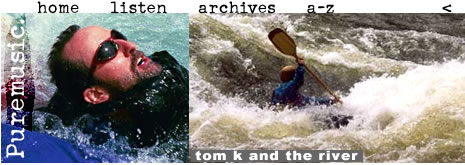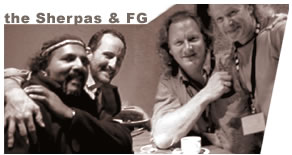
A CONVERSATION WITH THE SHERPAS (continued)
PM: So what did you have, Martin Backpackers [those are little travel guitars], or--
ML: I had a Taylor and he had a Breedlove travel guitar.
PM: I didn't know Breedlove made a travel guitar. Is it great?
TK: It was. They don't make it anymore.
ML: It was great until it got soaking wet on the Grand Canyon.
TK: Yeah, it was made by this company in Oregon called Green Mountain. And Breedlove was distributing, that was their backpacker guitar for a while. But it was exceptionally nice sounding.
PM: I bought a Vagabond recently, and I'm crazy about it.
TK: No kidding.
PM: As far as I know, they were the original travel guitars before Martin and a few other companies started knocking them off--pathetically, as far as I'm concerned. And then they disappeared. And then recently they resurfaced, and Kevin Smith did a run of them. [Jill Sobule has always been their poster girl, and I saw her playing one in last week's episode of "The West Wing," (2/12/03) the scene in the D.C. bar.]
TK: Can you keep it in tune?
PM: Oh yeah.
TK: John McVey plays a baby Taylor and plugs it into a pedalboard. It sounds pretty good, but he has some tuning problems.
TPR: I'll tell you what, I took my Baby Taylor to India, and I'll tell you why. I've had this friend Pete Meeley, he went to Burma with backpacks. I said, "Man, how could you stand to be without a guitar." He said, "I took it. I fit it in my backpack." I said, "How did you do that?" He said, "The baby Taylor has got two screws in the neck. I took the screws out. I left the strings on. I bent the neck over, and it fit right in the backpack." I said, "I'm going to do the same thing when I go to India." That's what I did.
PM: Oh, my God! Left the strings on it and just doubled it over in your backpack.
TPR: Yeah, man, you can leave the strings on. Elixir strings, I might add. [laughter]
[Lille is also the Head of Artist Relations at Elixir Strings, the choice of many discriminating players.]
ML: We didn't do that with our guitars in Bhutan or Nepal. Actually, in Nepal I carried a thin Yamaha. It was long, but really thin. But in the Grand Canyon, I carried that Baby Taylor. It's great. I mean, we actually, in the Grand Canyon, went in these little side canyons with a minidisk recorder that our buddy, Bob Beasley, brought.
TK: My hero.
ML: He's the ultimate vagabond.
PM: Oh, he's Mr. Kayaker.
ML: He's been in every little corner or crazy spot in the world and has an awesome story to tell.
PM: Oh, got to meet him.
ML: Yeah, and he's a great boater. Oh, this guy, he's like world class. And he's the biggest music lover I've met--not a musician, though now he's learning to play saxophone, and he's come a long way.
TK: Yeah, he's got soul.
ML: But man, he's a nut. He's a great paddler. Paddled all over the world. He's run twelve Grand Canyon trips, never saw a flipped raft, until our trip where we flipped three.
TK: He flipped his.
ML: He flipped his--his first flip, the first time he's ever seen a flip on the Grand Canyon.
TK: We flipped three rafts. We had three swimmers through lava, it was epic.
PM: "Three swimmers through lava," is that what you said?
ML: Yeah.
TK: I was one of them.
PM: Translate that?
ML: Lava is a 37 foot drop on the canyon. It's the big daddy graduation day bad ass run.
TK: Yeah, it's unbelievable.
ML: And you scout it from about a mile above the river, so it doesn't look that bad.
TK: It looked bad to me.
ML: And you get in, and all of a sudden it's like, "Okay, I'm in the washing machine, and somebody closed the door."
PM: Oh, my God!
ML: It's awesome.
TK: It scared the living be-Jesus out of me.
PM: And you could die, right, you could straight-up die?
TK: Damn sure could.
ML: People do die. We've lost a couple pals. Neither one of us ever lost a really close pal.
TK: Yeah. But we've--
PM: You mean lost them, dead?
ML: Yes.
TK: The last run Michael and I did before we went to Nepal in '96, we traveled with a really sweet guy from Miami. And when we went to Nepal, he went to Africa and never came back. He didn't come back.
ML: But that's what I mean about the river being religious. Man, as soon as you just take a second and you don't respect it, as soon as you don't remember that the river is actually the boss, that's when you get in trouble.
TK: I mean, we're talking about all those things that are connected to spirit, it's such a harmonizing force. If you're not in tune with it, and you're trying to defeat it, you're relentlessly punished. But if you can get yourself in harmony with the flow of the river, your whole body energy changes, and it's fun. You're dancing on the river, you're dancing with the river. And I mean, every kayaker gets that experience, trying to fight with the river, struggling to assert our own weird earthbound control on the river. But the river will have none of it. So it brings you into harmony with a deeper part of yourself, there's no question about it.
ML: And there are so many metaphors and parallels with it, just negotiating your way through life. Basically your job as a kayaker is to find your best way through a rapid, find the best way to negotiate what is there--not to change it. You're not going to change the river. You're not going to all of a sudden get out there and move a rock and make this little eddy easier to catch, and get the nice clean path over to avoid that hole. Your job is to work with what's there. And I think that's a metaphor for life.
To me, that's the spiritual aspect of it. And it's very, very powerful. But as soon as you start to learn to let it do some of the work--like when you're first learning, you're doing all the work. You get off the river with a beginner paddler, they're just absolutely whipped. They took a million strokes for your thousand. And then, as you start to get your boat in the right position and let the river move it to where it's going to move it, then paddling becomes really a graceful, beautiful sport. Everybody thinks it's a big strength sport, too. But a lot of paddlers I know are petite women. It's all about balance. I mean, strength can get you out of some trouble occasionally. But mostly it's about balance.
PM: Wow. So thanks, guys, it was an amazing conversation.
TPR: Before we're all done, though, one more thing. Me and Michael Lille, born on the same date, the same year.
PM: Really?
ML: Me and Tom Kimmel, same middle name, Eugene.
TPR: And me and Tom, same first name. [laughter]
PM: But you two have the exact same birthday?
ML: Born the same day, same year. April 11th, 1958. He in Ethiopia, me in Virginia.
PM: Wild.
ML: And we didn't know that until we were out on the road, on the Internet Quartet tour. After a gig, walking toward the bar, I said, "Tom, how old are you?" And at the time, he was maybe 36, 37, whatever it was. And I was the same age. And I said, "When is your birthday?" And I swear I had this feeling he was going to say April the 11th. I just felt it. And he said just that.
PM: Well, there you have it, people. Some tales from the Sherpas, coming soon to your town.
![]()
 |
|
| print (PDF) | |
| listen to clips | |
| thesherpas.net | |
| puremusic home | |
| archives | |